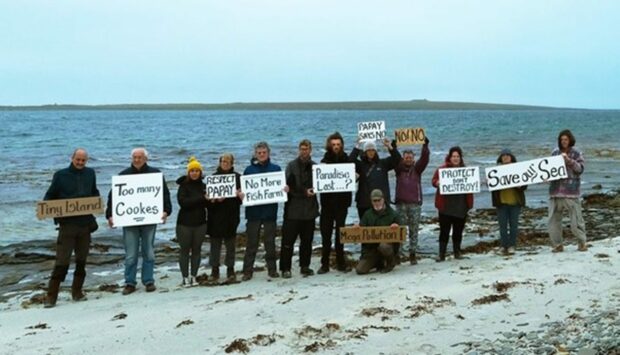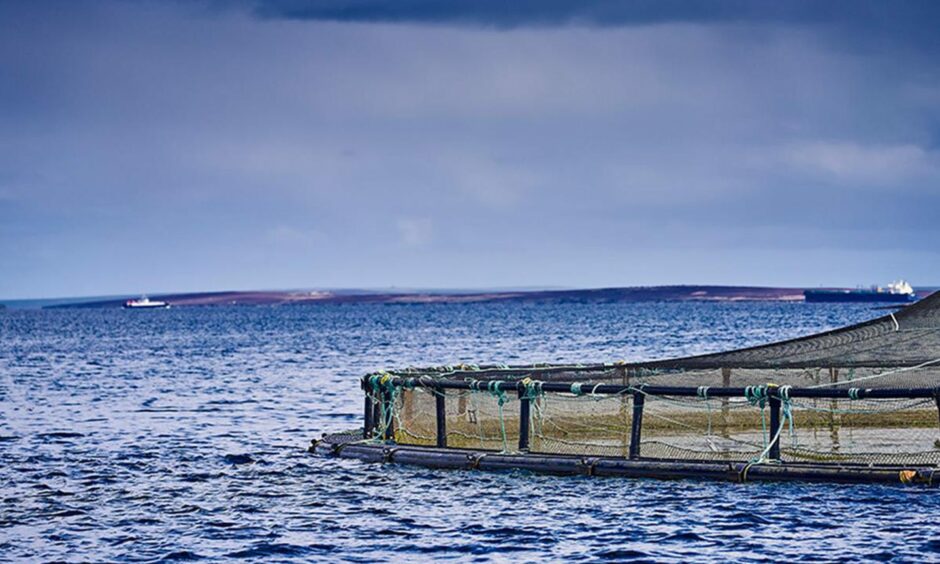Campaigners on Papa Westray are urging the Scottish Government to impose an immediate ban on salmon fish farming developments across the country.
The call from Save Papay Halt the East Moclett Fish Farm on Papa Westray group comes after Orkney Island’s Council’s planning committee approved a new salmon farm on Papa Westray.
The application, from Cooke Aquaculture Scotland Ltd, was backed despite being met with dozens of objections – a decision campaigners called “astonishing”.
Now they have written to Environment Minister Mairi McAllan calling for a moratorium on all new and existing developments for fish farms.
Campaigners claim the recommendation of a Scottish Parliament committee report in 2018 to gather better environmental data on the impact of wild salmon has not been carried out.
The letter reads: “We have been astonished by Orkney Island Council’s decision on September 8 to allow one of the biggest fish farms in Scottish marine history to be given the go-ahead in the waters off East Moclett, North Sound, Papa Westray, Orkney.
“We are urging you to use your Scottish Ministerial legal powers to halt this – and all other fish farm developments – until you align the considerable recommendations of the Scottish Parliament’s Environment, Climate Change and Land Reform Committee report on the environmental impacts of salmon farming, with the actual position in November 2022.”
‘Enough is enough’
The planning application from Cooke Aquaculture received no objections from Sepa, the Papa Westray Community Council, or the Orkney Trout Fishing Association.
The plans also ticked the council’s own boxes, including those in an independent environmental impact assessment.
However, the Save Papay campaigners have slammed the planning process as “farcical” and for going against the community’s objections.
Wendy Elves, who lives on a farm at Vestness, described the newly approved farm as a “massive intrusion” on the “fragile environment”.
“Enough is enough,” she said. “We have seen an increase in salmon fish farming by stealth. Yet a Scottish Parliament committee report in 2018 said urgent action should be taken to gather better environmental data on the impact on wild salmon.
“This has not been done and is just one of the reasons this damaging farm – and all others – must be halted.”
Christopher Rutherford, a supporter of the Save Papay, is rebuilding a family croft on Papa Westray, where his ancestors have lived for generations.
He is urging the Scottish Government to “step up” and support their pledge for Blue Carbon in Scotland.
Mr Rutherford argued the coast of the island has complex marine system, including vital kelp and seagrass, which must be protected.
He added: “The latest fish farm is being portrayed as ‘offshore’ when this is clearly not the case. The East Moclett site is really an ‘inshore’ fish farm. The Scottish Government’s classification for off-shore is 12 nautical miles or more. This is less than 2 miles and will be highly visible, even at night with its lights on, from much of our island.”
‘Protecting a thriving marine ecosystem’
A Scottish Government spokesman saidd planning applications involving salmon farms are dealt with by local authorities. He stressed the aquaculture industry is “diverse” while protecting a “thriving marine ecosystem”.
He said: “Aquaculture is a significant employer in Scotland’s rural and coastal communities and its wider UK and global supply chain. It provides well paid jobs and produces healthy, quality food that is enjoyed worldwide.
“We have established the Scottish Aquaculture Council which brings together key organisations from industry, environmental and community interests which will advise on future aquaculture policy.
“It will help ensure that Scotland’s aquaculture industry is diverse, competitive and economically viable – achieving its full potential and protecting a thriving marine ecosystem for future generations.”


Conversation